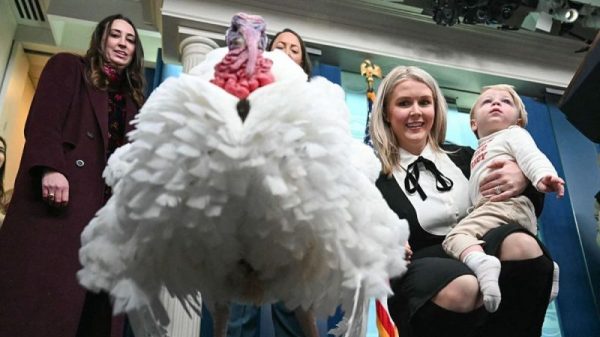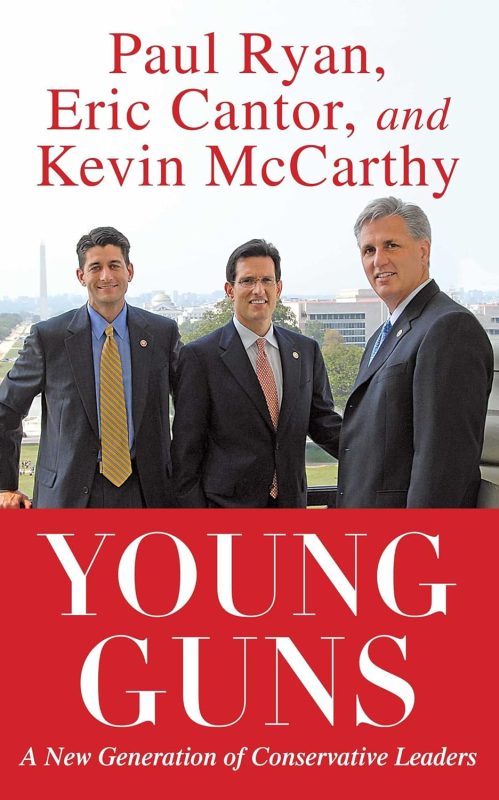Shortly before the 2010 election, a trio of House Republicans published a book that they hoped would plant a flag for the future of the party. Titled “Young Guns,” it argued for a change in how the party approached politics following two challenging election cycles. The unsubtle, tacit point of the book, of course, was to position the authors as the “new generation of conservative leaders” the book’s subtitle promised.
For a while, they were. The book was written by Republican Whip Eric Cantor (R-Va.) and Reps. Paul D. Ryan (R-Wis.) and Kevin McCarthy (R-Calif.). Cantor became Republican leader. Ryan was the party’s vice-presidential nominee. He and McCarthy became House speaker.
Each later suffered remarkable rebukes from the party they wanted to lead. Reading the book in 2023 — as McCarthy’s rebuke is unfolding — makes clear why it happened: The direction they were hoping to lead the party is not the direction the base wanted to go.
In substance, the book makes the argument that ostensibly undergirded the tea party movement, the right-wing push that was driving Republican politics in 2010. Cantor, Ryan and McCarthy — each of whom wrote a section of the book — argue primarily for a new focus on fiscal restraint in the early years of the Barack Obama administration. A forward by conservative columnist Fred Barnes delineates the role of each in this effort: “Cantor the leader, Ryan the thinker, McCarthy the strategist.”
Despite the overlap on spending, “Young Guns” doesn’t talk about the tea party very much. In his section, McCarthy does point to the movement’s energy as complementary to their collective “young gun” candidate recruitment effort. It’s very much in keeping with the approach to the insurgency at the time: See if it can be leveraged, but keep it at arm’s length.
But the tea party was never primarily about spending. It was reactionary, a response to changes in the country that manifested acutely in Obama’s presidency. But the organizing for it depended on established institutions such as Fox News and Americans for Prosperity, groups interested in amplifying opposition to spending. That became the narrative that defined the movement and that was the issue that the “young guns” sought to address.
Cantor was the first to be hobbled. In 2014, he sought his party’s nomination for his House seat, something that would generally be easy for a senior party leader. But Cantor, accused of being more focused on Washington than on his district, lost. That criticism was commonplace in the wake of his loss, but it, too, was incomplete. This Washington-vs.-district framing was apparently literal, but also figurative. A surge in children arriving at the border heightened immigration as a political issue, and fringe-right voices began hammering the GOP on it.
In the wake of Obama’s reelection victory in 2012 (and Ryan’s loss as the vice-presidential candidate), the party, Cantor among them, flirted with softening its position on immigration. Suddenly, this was sharply at odds with the base. The tea party, too, had included a focus on immigration through the lens of government benefits aiding those who’d come to the country. By 2014, that had evolved into right-wing demagoguery on immigration directly, and Cantor was caught flat-footed.
Ryan was next. In 2015, Donald Trump announced his candidacy for the 2016 Republican presidential nomination, with observers quickly dismissing his chances. He was simply too demagogic, attacking immigrants and Republican leaders in a way that the base surely wouldn’t accept. Except, of course, that they did. His evolution of tea party politics, MAGAism, was hugely effective at building support.
By October 2015, House Speaker John A. Boehner (R-Ohio) had had enough. Holding a position of authority in a party that was increasingly hostile to established authority was untenable. So Boehner walked away. So House Republicans turned to their most recent vice-presidential candidate to run their caucus.
Our very weak and ineffective leader, Paul Ryan, had a bad conference call where his members went wild at his disloyalty.
— Donald J. Trump (@realDonaldTrump) October 11, 2016
But Ryan soon found himself struggling against the loudest voice in his party. Trump was increasingly centering Republican politics on himself and his presidential candidacy. Right-wing House members echoed his rhetoric and at times his tactics. In 2018, with a Democratic majority looming, Ryan announced that he wouldn’t seek reelection.
Only McCarthy was left. He’d risen through House Republican leadership to assume the top non-speaker position in the caucus. With Ryan gone and his party in the minority, McCarthy was the top Republican in the House, and it was his job to control a conference by now fully infected with Trumpist politics.
That was easier when Democrats controlled the House, since the conference could unite in opposition to the left. When Republicans took power in January 2023, though, the conference splintered between far-right and quite-right, with McCarthy winning election as speaker only after multiple votes. And only after agreeing to let any member of the House call for his ouster. On Monday, Rep. Matt Gaetz (R-Fla.) did — and McCarthy’s tenure at the top of Republican leadership wobbled.
It’s not solely that the “young guns” aimed in the wrong direction in their 2010 book. The House GOP conference, and the right-wing media that energizes them, are hostile to leadership in most forms, and the “young guns” became leaders. But they were also wrong, as the other “young guns” highlighted in the book make clear.
The book focused on three who’d recently joined the House, legislators who embodied the “young guns” spirit. There was Rep. Lynn Jenkins (R-Kan.), who won in 2008 but decided not to run again in 2018. Rep. Erik Paulsen (R-Minn.) had also won in 2008 but was ousted by a Democratic challenger 10 years later. And then there was Rep. Aaron Schock (R-Ill.), who “brought a unique combination of youth and enthusiasm and yet a surprising amount of experience to the campaign.” Until he resigned in disgrace in 2015.
There were also five candidates on the ballot in the upcoming election who were featured in “Young Guns.” Wisconsin’s Sean P. Duffy won, but resigned in 2019 because of a family health issue. There was Cory Gardner, who won and soon thereafter was elected to the Senate. He lost his bid for reelection in 2020.
The other three candidates had different paths. Rep. Charles Djou (R-Hawaii) won a special election in 2010 but lost reelection that November. He eventually switched his party registration to independent and endorsed Joe Biden in 2020. Rep. Martha Roby (R-Ala.) won in 2010 but declined to seek reelection in 2020 after criticizing Donald Trump. Those criticisms fell well short of those offered by the fifth Republican candidate mentioned in “Young Guns”: Illinois House candidate Adam Kinzinger.
It’s easy to read more into the publication of “Young Guns” than is deserved. That the book promised a new generation of leadership helmed by the men on its cover, though, planted a useful flag in the sand. It was a bet that Cantor, Ryan and McCarthy were making in 2010, a bet that their politics and their political movement, then carefully overlapping with what they heard from the tea party, would allow them and their party to consolidate power.
For a little bit, it worked. But then a much more powerful force emerged from a skyscraper in Manhattan and shifted the party in a different direction. McCarthy held on longer than the other two — but no one could hold on forever.






































